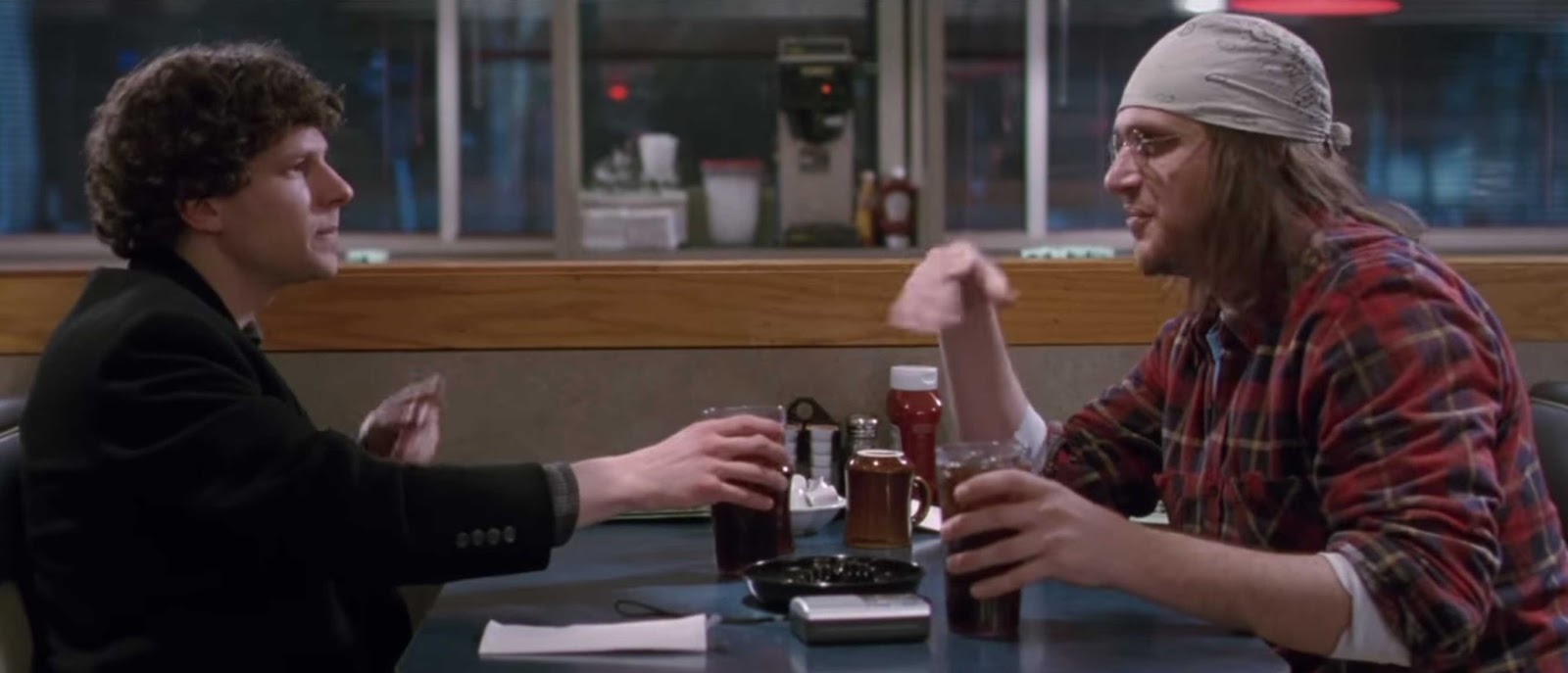By Chlotrudis Independent Film Society
Rating: 3 cats
Director: James Ponsoldt
Starring: Anna Chlumsky | Jason Segel | Jesse Eisenberg | Joan Cusack | Mamie Gummer

Country: united_states
Year: 2015
Running time: 106
IMDB: http://www.imdb.com/title/tt3416744
Jason says: “There are a lot of things that can be done with David Lipsky’s interview of David Foster Wallace, and I don’t think that a movie is at the top of the list. The magazine article it was originally intended for would supply analysis and context; a play might distill it; heck, animation might illuminate it. It would take a more ambitious movie than THE END OF THE TOUR to do much more than simply present it, and these people seem to deserve more.
“The interview in question too place in 1996, when Wallace (Jason Segel) had just published Infinite Jest to tremendous praise and Lipsky (Jesse Eisenberg) had just started a job at Rolling Stone. Lipsky suggests shadowing Wallace during the last few days of his book tour to his editor, despite the magazine never doing features on writers, and it somehow comes together, with Lipsky traveling to Bloomington, Indiana, where Wallace teaches at a small college, before accompanying him to Minneapolis. The two hit it off, but reminders that Wallace has his issues are never far away.
“Indeed, the film is bookended by scenes set after Wallace’s suicide in 2008, a decision which seems both clumsy and like a missed opportunity. It’s clumsy in that the three or four times that Wallace says something along the lines of ‘I’d rather be dead than X’ is forced to carry a too-solemn irony, and it sets the film up as a search for the signs of his depression being so severe that what we see of the interview alone doesn’t manage very well. On the other end, it seems to push the potentially interesting story of an ambitious Lipsky opting to revisit his tapes of the interview after Wallace’s death into the background. A shame, because that’s actually a fairly interesting ethical question to raise.
“Instead, much of the movie seems like a fairly simple set-up of mutual envy: Lipsky wishes he could write as brilliantly as Wallace does (or at least, receive some of the acclaim) while Wallace seems to have a somewhat smaller wish for Lipsky’s greater ease socially. In a fictional film, some progress would be made, but in this case the situation merely is. In addition, four or five days’ worth of conversation is often cut down to the elements which play easiest to the stars’ best-known strengths – the measured but piercing intellect for Eisenberg, the sloppily nerdy charm of Segel.
“That the pair are doing the things for which they are best known is not necessarily a negative; Eisenberg may give this performance a lot, but I doubt that I will grow tired of it so long as it fits the film as well as it does here. He’s funny and bitter in equal measure, and does a good job of serving as the audience’s way in to the story despite Lipsky being no everyman. Segel oftentimes seems to be doing a bit toward the start, the eccentric author out of central casting, but it’s a performance that will likely grow on a viewer by the end. He never quite seems wise compared to the slightly younger Lipsky, but Segel is strong as he shows Wallace trying to pass something on despite not feeling equipped.
“The main cast aren’t the only ones who seem to improve as the film goes on; though the dialog is always well-constructed (it’s unclear how much comes directly from Lipsky’s & Wallace’s conversations), it gets better toward the end, especially in some long bits from Wallace. Director James Ponsoldt seems to do tighter work as well, making good use of the wintry environment and small-city settings.
“I suspect that those more familiar with these writers than I am will have stronger opinions one way or the other; I’ve read that many fans of Wallace resent its very existence, along with that of Lipsky’s book which served as the primary source for Donald Marguiles’s screenplay. It’s not worth real scorn, though; it just needs to either build up to the interesting stuff better or have more going on throughout. 3 cats
“Seen 22 April 2015 in Somerville Theatre #1 (Independent Film Festival Boston 2015, DCP)”
Chris says: “Although the IFFB missed out on some Sundance narrative titles I had hoped to see (most notably Guy Maddin’s THE FORBIDDEN ROOM), the opening and closing night films were both solid. THE END OF THE TOUR marks director James Ponsoldt’s second time opening the festival, the first being 2013’s THE SPECTACULAR NOW. While the earlier film updated (and, to an extent, subverted) teen romantic comedies, this forgoes the biopic’s structural trappings to focus less on lives and careers and more on a specific incident between two real people. In 1996, shortly after the publication of his magnum opus Infinite Jest, David Foster Wallace was interviewed for Rolling Stone magazine by eporter David Lipsky, who flew out to Wallace’s then-home of Bloomington, Indiana and spent five days with him, accompanying him on a book tour stop in Minneapolis. The interview was never published, although Lipsky wrote his own book about it (which this film is adapted from) after Wallace’s 2008 suicide.”
